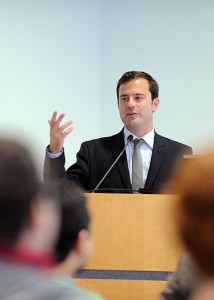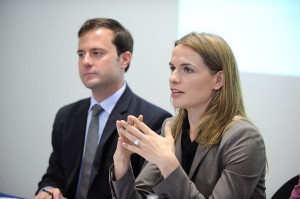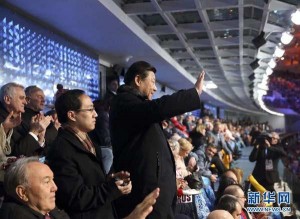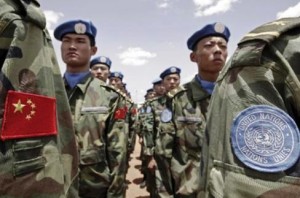Steven Hill on a New Beijing Consensus in UN Peace Operations
By Zachary Kelman and Desiree Sedehi*

Steven Hill on China's role in UN peace operations
Steven Hill, Visiting Professor from 2010-2011 at the Hopkins-Nanjing Center in Nanjing, China, visited Seton Hall Law School on September 22, 2011, and spoke in a personal capacity about the research he conducted there on the subject of Chinese participation in UN peace operations. At an event hosted by Professor Margaret K. Lewis, a Public Intellectuals Program Fellow with the National Committee on US-China Relations, and Professor Kristen E. Boon, Director of Seton Hall Law’s International Programs, he posed the following questions: How has China’s approach to international relations changed since assuming its role on the UN Security Council in the 1970s? And is China’s approach to the humanitarian intervention in Libya the harbinger of a new “Beijing Consensus”?
In his presentation, Mr. Hill discussed the evolution of China’s approach to foreign relations, from the “Molotov cocktail-throwing revolutionaries” of the early 70s to the top contributor to peacekeeping missions among the five permanent members of the Security Council. According to Mr. Hill, this movement signals a shift from “non-intervention” to “tolerance, maybe even some enthusiasm and engagement.”
Mr. Hill recounted for his audience how, from when the People’s Republic of China regained China’s seat in the UN in 1971 until the 1990s, China had been largely detached from UN peacemaking activities.
Mr. Hill noted that China’s “traditional approach” to UN peacekeeping privileges stressed the importance of non-intervention. While China’s position has evolved considerably as it applies to UN peace operations, shades of it can be seen, for example, in Ambassador Li Baodong’s 2011 statement that the international community should “respect the sovereignty, independence, unity and territorial integrity” of Libya.
Hill further noted, importantly, that in spite of this rhetorical deference to sovereignty, China abstained from voting on UNSCR 1973—an abstention which was instrumental in authorizing the largely European-led intervention in Libya. China’s rhetoric led many commentators to believe that it would vote against the resolution. However, China’s ultimate abstention has been seen by many to symbolize its larger shift from a non-aligned power to a global power that has a substantial stake in the international community.
According to Mr. Hill, that China felt it necessary to evacuate 36,000 workers from Libya due to this humanitarian crisis featured prominently in its decision on how to vote on the Libya resolutions. Moreover, China’s growing stake in the international community means increased interest in avoiding catastrophic scenarios, and hence likely a more active China on the global scene.
That being said, Mr. Hill cautioned against unbridled optimism with respect to China’s “new role.” He noted that China made every effort to defer to traditional notions of national—and then regional—self-determination. This position was evidenced by China’s acknowledgment of Arab League and African Union positions. In addition, China reserved abstention as a “special circumstance” and was careful not to set precedent. This cautiousness, said Mr. Hill, exemplifies China’s broader attitude toward UN peacekeeping—the possible emerging “Beijing Consensus”—to promote a limited “blue helmet” approach within the general understanding of military procedure, but to avoid “nation building” and other more interventionist forms of intervention. Whether this approach will change to a more progressive humanitarian attitude, as held by some of China’s Western counterparts on the Security Council, remains to be seen.
After Mr. Hill’s presentation, both Professors Lewis and Boon offered commentary to the audience. Professor Lewis,

Steven Hill & Margaret Lewis discuss the Beijing Consensus at Seton Hall Law School
who recently appeared before the Congressional-Executive Commission on China in a roundtable discussion on the “Current Conditions for Human Rights Defenders and Lawyers in China, and Implications for U.S. Policy,” raised China’s need for global stability for the safety of its investments as an impetus for its increased role in UN peace operations. Professor Lewis further emphasized that China’s increased participation in UN peacekeeping efforts may be improving its reputation in the eyes of the international community. Such positive reputational benefits could encourage China’s future involvement.
Professor Boon, who has written extensively on the UN and the Security Council, suggested it might be wise for the US to rethink its skepticism towards international institutions, given the growing influence of China. The United Kingdom took the approach in the 20th century of placing greater emphasis on international institutions. As its national power waned relative to the rising US, it has maintained a far more powerful seat in global affairs than it would have if it had not actively engaged in international institutions. The US has an opportunity to solidify its interests in the current international legal and political order, which could serve it well in the future. Professor Boon also highlighted the importance of the new Draft Articles on the Responsibility of International Organizations, and suggested that these could affect the willingness of permanent Security Council members to engage in new endeavors as much as a new “Beijing Consensus.”
Following their commentary, both Professors Lewis and Boon invited the audience to ask questions and provide comments. Professor Michael Ambrosio of Seton Hall Law School asked Mr. Hill to comment on the success and efficiency of China’s participation in UN peacekeeping, and to rate China’s involvement. Mr. Hill responded that he would rate China’s increased participation quite high, and noted that China has provided crucial assistance in terms of medical and engineering troops, police units, and military observers to UN missions around the world. Mr. Hill emphasized the dire need for police units and explained that China’s assistance in this capacity was especially successful because it was so necessary.
* The authors are both third-year Juris Doctor students at Seton Hall University School of Law. Mr. Kelman is also a Deborah T. Poritz Fellow and Ms. Sedehi is the former president of Seton Hall’s International Law Society.
 On Facebook
On Facebook By Email
By Email 







